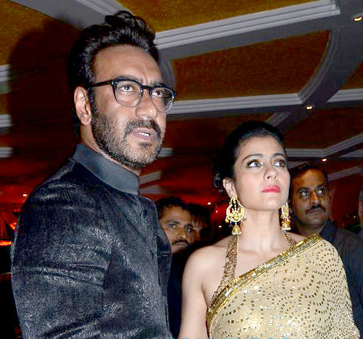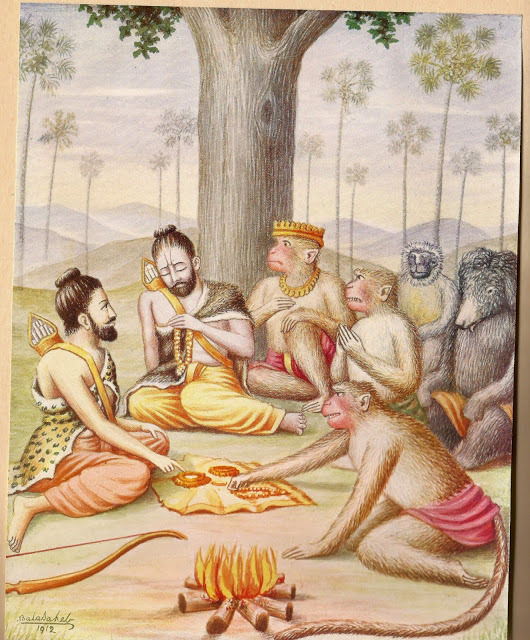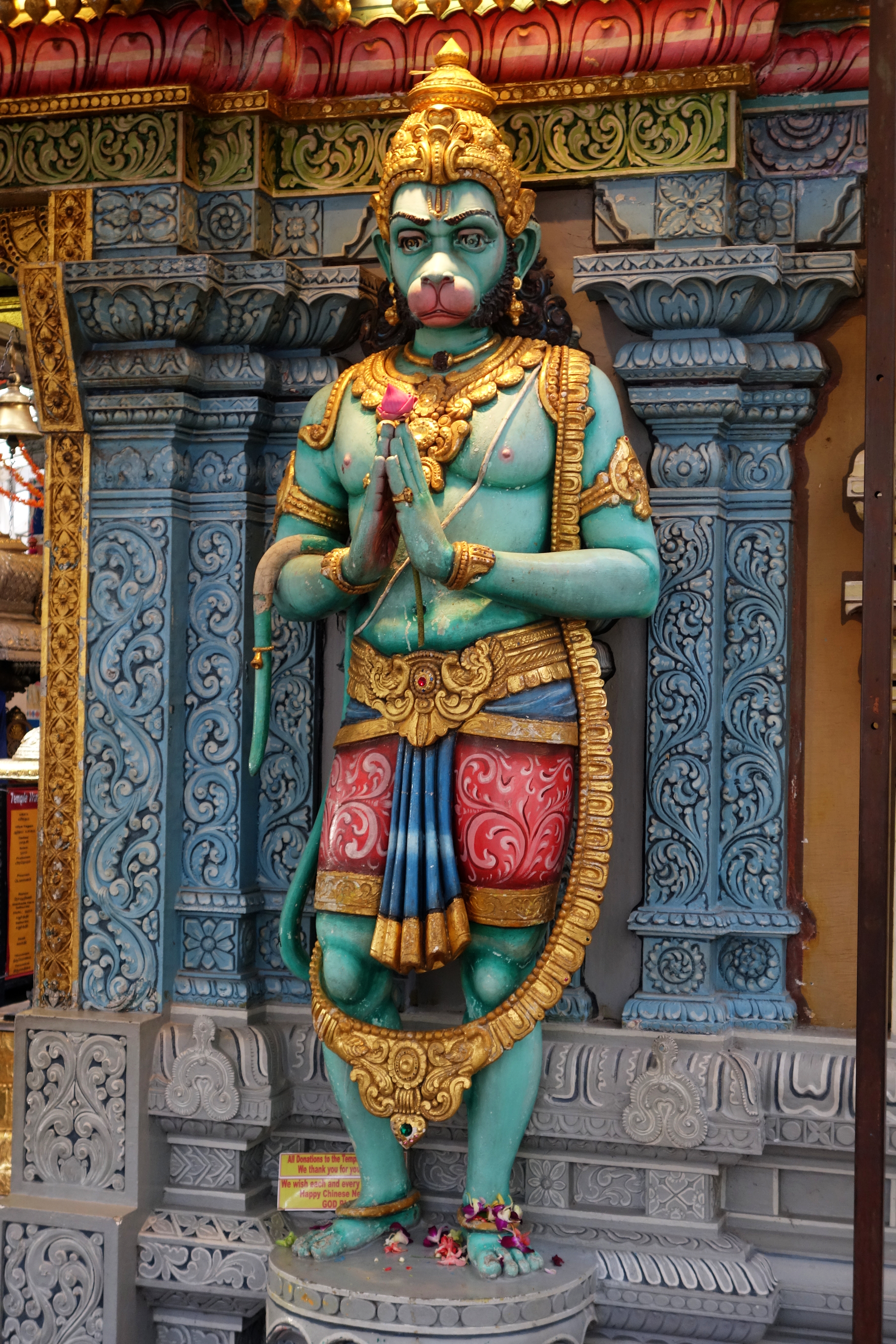|
Ramleela – Ajay Devgn Ke Saath
''Ramleela – Ajay Devgn Ke Saath'' (English: '' Ramleela - With Ajay Devgn''), commonly known as ''Ramleela'' is a mythological on-stage musical drama, based on the famous Indian epic poem '' Ramayan''. The show premiered on 21 October 2012 on Life OK and completed the story in five episodes on 18 November 2012. The show was narrated by Bollywood actor Ajay Devgn, who provided a prologue at the beginning of each episode or act. The show aired during the period from Dussehra (the day Rama killed Ravana) in October till Diwali in November (the day Rama returned to Ayodhya, after 14 years of exile). The show was divided into 5- to 10-minute skits combined with songs and dances performed by the main cast and other actors. Bollywood actors and Indian television stars played the roles of the characters. The grand sets and choreographer Remo D'Souza were much appreciated. Plot Sage Vishwamitra's rituals are plagued by demons. Young princes Rama and Lakshmana (sons of King Dasharath ... [...More Info...] [...Related Items...] OR: [Wikipedia] [Google] [Baidu] |
Ajay Devgn
Vishal Veeru Devgan (born 2 April 1969), known professionally as Ajay Devgn, is an Indian actor, film director and producer who works in Hindi cinema. Devgn has appeared in over a hundred films and has won numerous accolades, including four National Film Awards and four Filmfare Awards. In 2016, he was honoured by the Government of India with the Padma Shri, the fourth-highest civilian honour of the country. Devgn began his professional career with ''Phool Aur Kaante'' in 1991. He then rose to prominence as an action hero starring in successful films such as ''Jigar'' (1992), '' Dilwale'' (1994), ''Diljale'' (1996). He went on to give critically acclaimed performances in ''Hum Dil De Chuke Sanam'' (1999), ''Company'' (2002), ''Deewangee'' (2002), for ''Zakhm'' (1998) and ''The Legend of Bhagat Singh'' (2002), he won National Film Award for Best Actor. After the success of '' Golmaal: Fun Unlimited'' (2006), he went on to collaborate with Rohit Shetty on a number of action ... [...More Info...] [...Related Items...] OR: [Wikipedia] [Google] [Baidu] |
Sita
Sita (; ) also called as Janaki and Vaidehi is a Hindu goddess and the female protagonist of the Hindu epic, ''Ramayana''. She is the consort of Rama, the avatar of the god Vishnu, and is regarded as a form of Vishnu's consort, Lakshmi. She is also the chief goddess of Rama-centric Hindu traditions. Sita is known for her dedication, self-sacrifice, courage, and purity. She is one of the seventeen national heroes (r''astriya bibhuti'') of Nepal. Described as the daughter of Bhūmi (the earth), Sita is brought up as the adopted daughter of King Janaka of Videha. Sita, in her youth, chooses Rama, the prince of Ayodhya as her husband in a swayamvara. After the swayamvara, she accompanies her husband to his kingdom, but later chooses to accompany her husband, along with her brother-in-law Lakshmana, in his exile. While in exile, the trio settles in the Dandaka forest from where she is abducted by Ravana, the Rakshasa king of Lanka. She is imprisoned in the garden of Ashoka Vatik ... [...More Info...] [...Related Items...] OR: [Wikipedia] [Google] [Baidu] |
Meghanad
Meghanada (), also referred to by his epithet Indrajita , according to Hindu texts, was the crown prince of Lanka, who conquered Swarga, Indraloka (Heaven). He is regarded as one of the greatest warriors in Hindu texts. He is a major character mentioned in the Indian epic ''Ramayana.'' Meghnada is the Protagonist, central character in Bengali poetry, Bengali ballad ''Meghnad Badh Kavya''. He played an active role in the great war between Rama and Ravana. He acquired many kinds of celestial weapons from his Guru Shukra. His most prominent feat is having defeated the deva (Hinduism), devas in heaven. Using the Brahmastra, Indrajita killed 670 million vanaras in a single day; nearly exterminating the entirety of the Vanara, vanara race. No warrior had ever achieved this statistical feat before in the Ramayana. Etymology Indrajita had the special ability to fight from the sky, hidden behind the clouds. That is why both Rama and Lakshmana were defeated during the battle and were tie ... [...More Info...] [...Related Items...] OR: [Wikipedia] [Google] [Baidu] |
Vibhishana
Vibhishana () is the younger brother of Ravana, the King of Lanka, in the ancient Indian epic Ramayana. Though a rakshasa himself, Vibhishana turned his back on Ravana, and defected to Rama's side, owing to his dharma. After Rama defeated Ravana, the former crowned Prince Vibhishana as the King of Lanka before returning to Ayodhya. Ramayana Prince Vibhishana is portrayed as a pious and pure of heart in the epic. After performing a penance to invoke a boon from Brahma, he begged the deity to always set his mind on the path to righteousness, and nothing more. Vibhishana was the youngest son of the rakshasi Kaikesi and the sage Vishrava, who was himself a son of the sage Pulastya, one of the Prajapati. Vibhishana was the younger brother of the King of Lanka, Ravana, and also the sibling of Kumbakarna. Even though he was born as a rakshasa, he was pious and considered himself a Brahmin, since his father was a sage. Due to Vibhishana's differences with Ravana, and because he ... [...More Info...] [...Related Items...] OR: [Wikipedia] [Google] [Baidu] |
Lanka
Lanka (, ) is the name given in Hindu epics to the island fortress capital of the legendary asura king Ravana in the epics of the ''Ramayana'' and the ''Mahabharata''. The fortress was situated on a plateau between three mountain peaks known as the Trikuta Mountains. The ancient city of Lankapura is said to have been burnt down by Hanuman. After its king, Ravana was killed by Rama with the help of Ravana's brother Vibhishana, the latter was crowned king of Lankapura. His descendants were said to still rule the kingdom during the period of the Pandavas. According to the ''Mahabharata'', the Pandava Sahadeva visited this kingdom during his southern military campaign for the rajasuya of Yudhishthira. Ramayana The island was situated on a plateau between three mountain peaks known as the Trikuta Mountains. The ancient city of Lankapura is thought to have been burnt down by Hanuman. After its king, Ravana was killed by Rama with the help of Ravana's brother Vibhishana, the latt ... [...More Info...] [...Related Items...] OR: [Wikipedia] [Google] [Baidu] |
Vali (Ramayana)
Vali ( sa, वाली, nominative singular of the stem वालिन् (''Valin'')), also known as Bali, was a king of Kishkindha in the Hindu epic Ramayana. He was the husband of Tara, the biological son of Vriksharaja, the elder brother of Sugriva, and father of Angada. He was killed by Rama, an ''avatar'' of Vishnu. Vali was invincible during the''Treta Yuga''. Vali defeated some great warriors, only because he was blessed with the ability to obtain half the strength of his opponent. Rama killed Vali by shooting him in the chest. However, during his first attempt, Rama could not recognise between Vali and Sugriva due to their resemblance. Thus, during the next attempt, Sugriva wore a garland of red flowers and went to battle with Vali. This time, Rama could recognise Vali and shot an arrow that killed him. Early life Vali was the husband of Tara. As one myth goes, fourteen types of gem or treasure were produced from the churning of the ocean during the time of Kurma ... [...More Info...] [...Related Items...] OR: [Wikipedia] [Google] [Baidu] |
Sugreeva
''This character is about the vanara, in the Ramayana.'' Sugriva ( sa, सुग्रीव, , ) is a character In the ancient Indian epic Ramayana. He is the younger brother of Vali, whom he succeeded as ruler of the vanara kingdom of Kishkindha. Rumā is his wife. He is a son of Surya, the Hindu deity of the sun. As the king of the vanaras, Sugriva aided Rama in his quest to liberate his wife Sita from captivity at the hands of the rakshasa king Ravana. Nomenclature He is also known as jv, Sugriwa, th, Su-khrip, lo, Sugeep, km, Sukhreeb, Creole language, Creole: ''Soogrim'', lo, Sangkip, ta, Cukkirivan, my, Thugyeik, Sugreeva or Sugreev. Legend The story of Sugriva is part of Ramayana and in an abbreviated version, is also present in the Mahabharata. The king of Kishkindha, Vrikshraja, was a divine creature born from Brahma’s tilaka. He had the body of a human and face and tail of a monkey. He was instructed to roam the forests and kill demons. One day, Vriks ... [...More Info...] [...Related Items...] OR: [Wikipedia] [Google] [Baidu] |
Hanuman
Hanuman (; sa, हनुमान, ), also called Anjaneya (), is a Hindu god and a divine '' vanara'' companion of the god Rama. Hanuman is one of the central characters of the Hindu epic ''Ramayana''. He is an ardent devotee of Rama and one of the Chiranjivis. Hanuman is regarded to be the son of the wind-god Vayu, who in several stories played a direct role in Hanuman's birth, and considered to be an incarnation or son of Shiva in Shaivism. Hanuman is mentioned in several other texts, such as the epic ''Mahabharata'' and the various Puranas. Evidence of devotional worship to Hanuman is largely absent in these texts, as well as in most archeological sites. According to Philip Lutgendorf, an American Indologist, the theological significance of Hanuman and devotional dedication to him emerged about 1,000 years after the composition of the ''Ramayana'', in the 2nd millennium CE, after the arrival of Islamic rule in the Indian subcontinent.Paula Richman (2010), ''Review: Lut ... [...More Info...] [...Related Items...] OR: [Wikipedia] [Google] [Baidu] |
Jatayu
Jatayu ( sa, जटायुः, IAST: ) is a demigod in the Hindu epic ''Ramayana'', who has the form of either an eagle or a vulture. He is the younger son of Aruṇa and his wife Shyeni, the brother of Sampati, as well as the nephew of Garuda. He is also an old friend of King Dasharatha, Rama's father. Legend Flight towards the sun During their youth, Jatayu and his elder brother, Sampati, under a wager, flew towards Surya, the solar deity. Jatayu, careless due to his youthfulness, outflew his brother, and entered the Sūryamaṇḍala, the orbit of the sun, during noon. Due to the blazing heat of Surya, his wings started to get scorched. In a desperate bid to rescue his brother, Sampati flew ahead of him, spreading his wings wide open to shield him. As a consequence, it was Sampati who had his wings burnt, descending towards the Vindhya mountains. Incapacitated, he spent the rest of his life under the protection of a sage named Nishakara, who performed a penance in the ... [...More Info...] [...Related Items...] OR: [Wikipedia] [Google] [Baidu] |
Bharata (Ramayana)
Bharata ( sa, भरत, translit=bharata) is a character in the ancient Indian epic ''Ramayana''. He is the son of Dasharatha, the virtuous king of Kosala, and Kaikeyi, daughter of the King Ashwapati of Kekeya. He is a younger half-brother of Rama and rules Ayodhya while Rama is banished from the country and fights to recover his wife Sita, kidnapped by Ravana. He is married to Mandavi, daughter of Kushadhvaja, with whom he has sons – Taksha and Pushkala. In the ''Ramayana'', Bharata is presented as a symbol of dharma. He is also an incarnation of Sudarshana Chakra, the divine weapon of Vishnu, while Rama is the incarnation of Vishnu himself. Today, Bharata is mostly worshipped in Kerala. One of the few temples in India dedicated to him is the Koodalmanikyam Temple. Etymology According to Monier Monier-Williams, ''bharata'' in Sanskrit means "one to be r beingmaintained".Monier Monier-Williamsभरत Sanskrit English Dictionary with Etymology, Oxford University Pre ... [...More Info...] [...Related Items...] OR: [Wikipedia] [Google] [Baidu] |
Kaikeyi
Kaikeyi (Sanskrit: कैकेयी, IAST: Kaikeyī) is the second consort of King Dasharatha, and a queen of Ayodhya in the Hindu epic Ramayana. Out of Dasharatha's three wives, Kaikeyi exerts the most influence. Formerly the princess of Kekeya, she is described to have served as an able counsellor to her husband during times of war. She is the mother of Bharata. Initially loving and motherly towards her stepson, Prince Rama, Kaikeyi's mind is poisoned by Manthara, her maid. Under her influence, Rama is exiled to the forest for a period of fourteen years. Legend Birth and early life Kaikeyi is born to King Ashvapati of Kekeya shortly before her mother was exiled. She was raised with her only mother figure being her hunchbacked nursemaid, Manthara. She is raised with seven brothers, including her twin, Yudhājit. Boons In a battle between the devas and the asuras, Dasharatha rode to Devaloka, accompanied by Kaikeyi, to help Indra fight against the asuras. The deva ... [...More Info...] [...Related Items...] OR: [Wikipedia] [Google] [Baidu] |
Manthara
''Manthara'' ( sa, मन्थरा; lit: "humpbacked") in the Hindu epic ''Ramayana'' convinced Queen Kaikeyi that the throne of maharaja belonged to her son Bharata and that her step-son—crown-prince Rama (the hero of the ''Ramayana'')—should be exiled from the kingdom. She was like a mother figure to Kaikeyi and her twin Yuddhajit, for their mother was banished. She accompanied Kaikeyi to Ayodhya after her marriage to Dasharatha. Influence on Kaikeyi As family servant of Kaikeyi, Manthara lived with her from the time of her birth. When she hears that King Dasharatha is planning to make his eldest son, Rama, prince regent (rather than Bharata, his child by Kaikeyi), she flies into a rage and reports the news to Kaikeyi. Kaikeyi is initially pleased and hands Manthara a pearl necklace. Manthara reminds Kaikeyi of the two boons Dasharatha had given her when she had once saved his life in a celestial battle. Kaikeyi had kept these boons for later and Manthara declares t ... [...More Info...] [...Related Items...] OR: [Wikipedia] [Google] [Baidu] |










